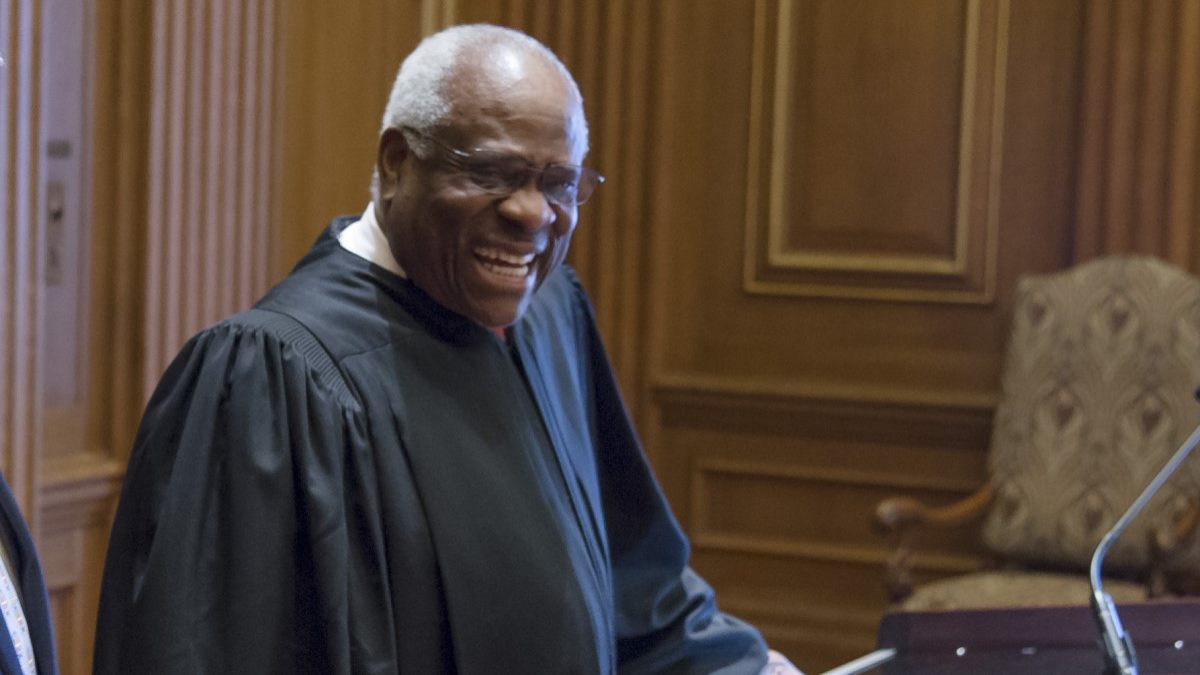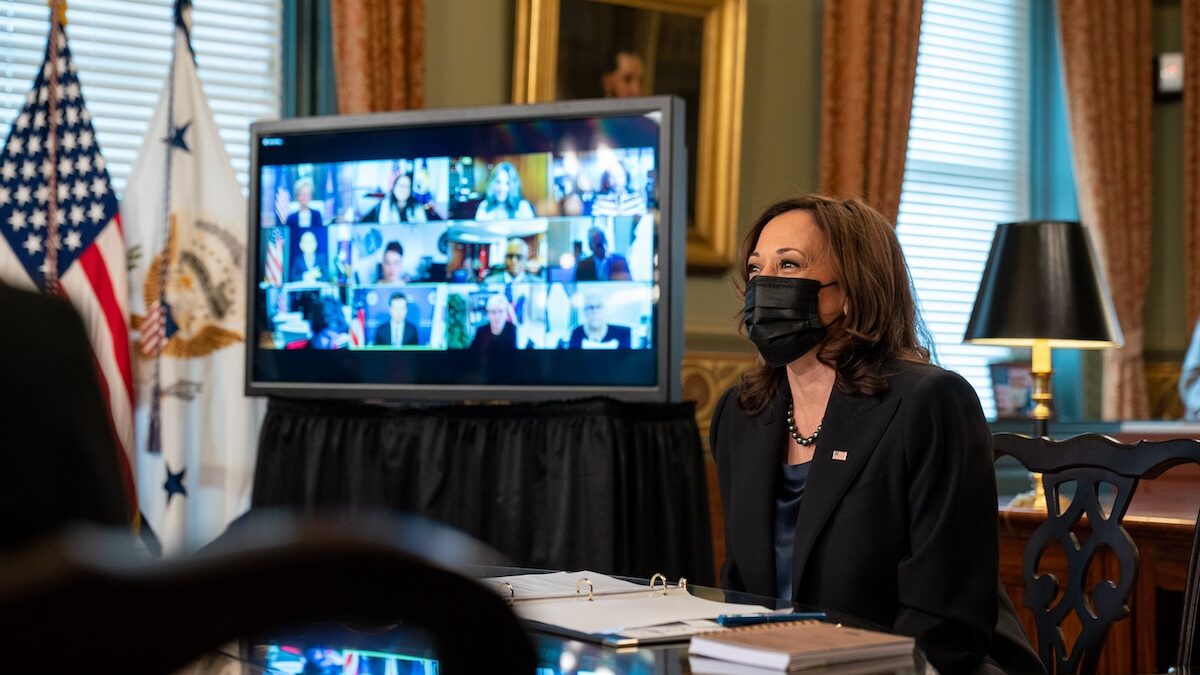Jane Mayer of The New Yorker magazine and her fellow lefties are ramping up attacks on conservative Supreme Court justices, as they fear the court is getting ready to issue a host of decisions they won’t like, most especially a ruling that may overturn Roe v. Wade. Mayer published a pathetic “hit” piece last week on Ginni Thomas, a long-time conservative activist and the wife of Justice Clarence Thomas. It’s a dud.
Mayer’s article, titled “Ginni Thomas’ Crusades: Is Ginni Thomas a threat to the Supreme Court?” is full of falsehoods and distortions, consistent with the malicious and error-filled book she co-authored in 1994, “Strange Justice: The Selling of Clarence Thomas.” Weaving together a mishmash of facts, conspiracies, and comments from dial-them-up liberal judicial ethics “experts,” Mayer argues that Ginni Thomas’ political activities and public comments on issues that come before the court require Justice Thomas to recuse himself from those cases.
But Mayer does not really care about judicial ethics. Rather, she wants to construct a case where only Ginni Thomas has to stop her political activity or Justice Thomas has to recuse himself. She invents a new “recusal” standard that liberal judges don’t follow and misrepresents what other judges in fact do in facing the same situation as the Thomases. Call it Jane Mayer’s version of feminism in 2022: conservative women can’t speak out on issues when their husbands are judges.
Judges Don’t Recuse Over Their Spouse’s Views
The relevant law requires a judge to recuse from a case “if his impartiality might reasonably be questioned” (28 U.S.C. 455(a)). Another provision requires a recusal if the judge knows that a family member has an “interest that could be substantially affected by the outcome of the proceeding” (28 U.S.C. 455(b)(5)(iii). Based on the law, standards, and past precedents, Ginni Thomas’s political and public policy activities have never in a single instance required Justice Thomas to recuse himself from a case.
It is well-established that a spouse’s separate political views or activities are no basis for such a recusal. In 2011, Judge Stephen Reinhardt, of the Ninth Circuit Court of Appeals and a liberal icon, properly refused to recuse from a challenge to the constitutionality of proposition 8 (regarding same-sex marriage) even though his wife was the executive director of the American Civil Liberties Union for Southern California (ACLU/SC), which had filed a brief at the district court level in this case, and despite his wife publicly expressing her views on the issue.
“My wife and I share many fundamental interests by virtue of our marriage, but her views regarding issues of public significance are her own, and cannot be imputed to me, no matter how prominently she expresses them. It is her view, and I agree, that she has the right to perform her professional duties without regard to whatever my views may be, and that I should do the same without regard to hers,” Reinhardt wrote in Perry v. Schwarzenegger (2011).
Reinhardt also properly rejected the claim that his wife had an “interest” under section 455 (b), even though the organization had filed an amicus brief in the district court for the case now on appeal before him. Thus, Judge Reinhardt demolished every argument from Mayer and her so-called judicial ethics experts that Ginni Thomas’ activities or views require Justice Thomas to recuse.
Mayer’s ‘Expert’ Flips Positions Based on Politics
In fact, Stephen Gillers, whom Mayer cites as the gold standard for judicial ethics experts and who rips Ginni Thomas for “behaving horribly and hurt[ing] the Supreme Court and the administration of Justice,” filed a brief vigorously defending Reinhardt for not recusing:
We are long past the day when a wife’s opinions are assumed to be the same as her husband’s . . Ms. Ripson’s opinions, views, and public pronouncements of support for the district court decision below do not trigger any reasonable basis to question Judge Reinhardt’s ability to honor his oath of office. A contrary outcome would deem a judge’s spouse unable to hold any position of advocacy, creating what amounts to a marriage penalty.
Gilllers’ unprincipled and hypocritical attack on Ginni Thomas’ permissible conduct and speech is despicable.
Judge Reinhardt also said it is important that “judges not recuse themselves unless required to do so, or it would be too easy for those who seek judges favorable to their case to disqualify those that they perceive to be unsympathetic merely by questioning their impartiality.” To succumb to Mayer’s argument would be to institutionalize judge shopping.
As the late Justice Antonin Scalia observed, overbroad recusal standards “would also encourage so-called investigative journalists to suggest improprieties, and demand recusals, for other inappropriate (and increasingly silly) reasons.” Mayer’s smear piece is the embodiment of these concerns.
To Mayer, the Left Can Do What the Right Can’t
D.C. Circuit Judge Nina Pillard’s husband is David Cole, the national legal director of the ACLU, who has been very outspoken on many hot button constitutional issues. He was particularly outspoken in his opposition to the Trump administration.
In fact, Cole wrote an op-ed in May 2019 praising the D.C. district court judge’s May 26, 2019, ruling in Trump v. Mazars, rejecting President Trump’s arguments that he did not have to comply with a congressional subpoena for his tax records. Cole wrote that Trump “argued that House committees have no authority to investigate except where their investigation is tied to a specific piece of legislation. But that argument is dead wrong, and the federal courts have properly and resoundingly rejected it.”
After the D.C. Circuit three-judge panel ruled against Trump on his appeal of that district court decision, Judge Pillard, a Barack Obama appointee, sat on the D.C. Circuit en banc panel that rejected a petition to rehear the case by the full D.C. Circuit. Judge Pillard voted to let stand the D.C. Circuit panel opinion that ruled the exact way her husband advocated in his 2019 article.
To be clear, Judge Pillard is correct to not recuse herself from cases where her husband has opined on an issue that comes before her court, even if he has specifically commented on a case before she considers it. Cole’s statements do not provide the basis to question in any way the impartiality of Judge Pillard’s rulings.
Despite Jane Mayer’s efforts to impugn the integrity of Justice Thomas for properly not recusing in cases involving issues in which his wife may have commented in the public arena, these examples demonstrate that other judges with spouses in the public policy arena do exactly what Justice Thomas does. The only difference, for Jane Mayer, is that Ginni Thomas is a conservative activist and Justice Thomas is an originalist.
Justice Thomas Was Not Where Mayer Says He Was
In every example Mayer cites in her article where Ginni Thomas is involved with a group advocating a public policy position or making a filing in the Supreme Court, Ginni Thomas is not a “party” nor has an “interest” that would be substantially affected by the outcome of a Supreme Court decision.
In one example, Mayer even falsely claims that Justice Thomas attended a luncheon, Impact Awards. Ginni Thomas emceed the event where awards were given to conservative leaders. Mayer writes that a guest at the luncheon, Jerry Johnson, who was then the president of the National Religious Broadcasters, “later recalled that the Justice sat in front of him and was a ‘happy warrior,’ pleased to be watching his wife ‘running the show.’”
Mayer’s claim is 100 percent false. Justice Thomas was not at this Impact Award ceremony. In fact, he has never attended an Impact Award luncheon ceremony. I spoke with Johnson, and he told me Justice Thomas was not at this luncheon. Moreover, Johnson told me that neither Mayer nor anyone from the magazine ever attempted to contact him to ask him if he saw Justice Thomas at this event or made these statements.
A Packet of Malicious Smears
There are many more smears in this piece, the most snarky of which may be that Ginni Thomas failed to pass the bar exam. Mayer does not mention that Ginni Thomas passed it on her second try. Many others have failed on the first and passed on the second try, including Hillary Clinton, Kamala Harris, and Michelle Obama. But Mayer loves to smear.
I know firsthand how malicious Mayer can be. In “Strange Justice,” she accused me of violating the Anti-lobbying Act, a criminal law, when I was working on Justice Thomas’ confirmation in 1991 as a member of the White House Counsel’s office. Mayer wanted to create the false narrative of a White House willing to do anything to get Thomas confirmed, including me committing a felony. It was 100 percent false and defamatory.
I demanded a retraction and threatened to sue her, her co-author Jill Abramson, and the publisher if they did not strike this false accusation. I received a letter of apology from the publisher on behalf of Mayer and Abramson, and they struck that accusation from the paperback version of their book. Mayer was guilty of making scurrilous and false accusations then, and continues that practice today.
Ginni Thomas is a great patriot. She should continue to engage in her lifelong work of public advocacy, even on issues that could come before the Supreme Court.
This article has been corrected with respect to Judge Pillard and her husband’s public discussion of court cases she has adjudicated.









